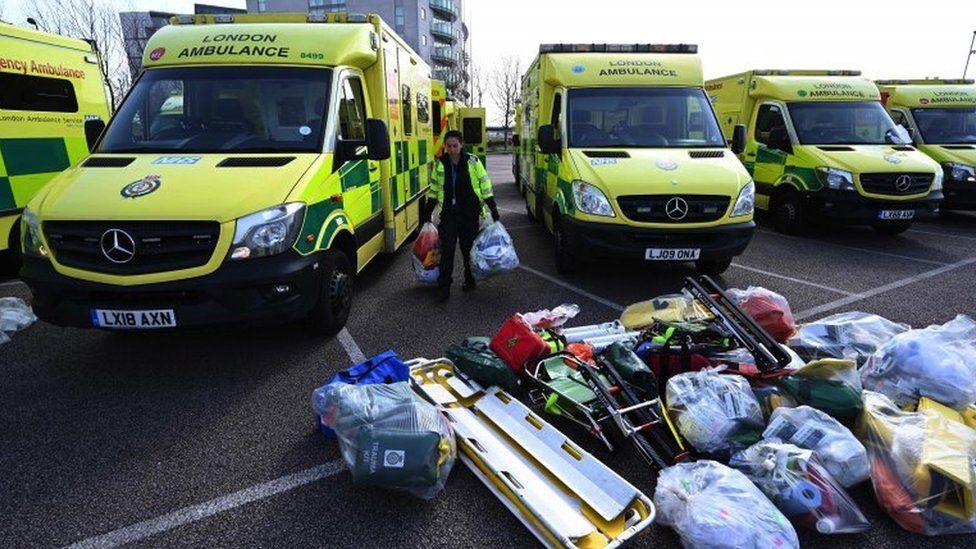Coronavirus: NHS turns to big tech to tackle Covid-19 hot spots
- Published

The NHS has confirmed it is teaming up with leading tech firms to ensure critical medical equipment is available to the facilities most in need during the coronavirus outbreak.
It blogged the firms would create computer dashboard screens to show the spread of the virus and the healthcare system's ability to deal with it.
These will draw on data gathered via 111 calls and Covid-19 test results.
The first should be made available to government decision-makers next week.
Four tech firms were named in the blog. Three are US-based: Microsoft, Google and Palantir. The fourth is Faculty AI, which is headquartered in London.
Amazon was not referenced but the BBC has confirmed that it is also involved. The NHS intends to add details of the company's role later.
Many of the details of the scheme were first reported by the BBC on Thursday.
Vulnerable groups
The blog confirmed that NHSX - a unit responsible for digital innovation - was heading the effort to harness a range of data sources, so that they could be used in combination.
The aim is to create dashboards that draw on the information as soon as it becomes available in order to help the government and health chiefs to:
- Understand how the virus is spreading and identify risks to particularly vulnerable groups of people
- Proactively increase resources in emerging hot spots
- Ensure critical equipment is supplied to hospitals and other facilities in greatest need
- Divert patients to the facilities best able to care for them based on demand, resources and staffing capacity
It added that the information would "largely" be drawn from existing data sources, and would be anonymised so that individual patients could not be identified. It said this would involve removing names, addresses and other identifiers, and replacing them with a "pseudonym".
In time, it said, the aim was to provide a separate dashboard that could be viewed by the public.
Regarding the tech firms, it said:
- Microsoft had built a data store on its Azure cloud computing platform to hold the information in a single, secure location
- Palantir was providing use of its Foundry software tool, which analyses records to deliver a "single source of truth"
- Faculty AI was developing the dashboards, models and simulations that decision-makers would be presented with
- Google's G Suite of productivity apps might be used to collect and aggregate real-time operational data such as occupancy levels and A&E capacity
"Microsoft remains steadfastly committed to supporting the NHS every way it can at this critical time," Cindy Rose, the firm's UK chief executive said.
Although not mentioned, Amazon's AWS division will also provide additional cloud computing facilities.
- A SIMPLE GUIDE: How do I protect myself?
- AVOIDING CONTACT: The rules on self-isolation and exercise
- LOOK-UP TOOL: Check cases in your area
- MAPS AND CHARTS: Visual guide to the outbreak
- STRESS: How to look after your mental health
Privacy campaigners had raised concerns after details of the initiative leaked earlier in the week.
In particular, they questioned the involvement of Palantir, which has become controversial for its role in helping Immigration and Customs Enforcement (ICE) agents track and deport undocumented immigrants from the US.
Allow Twitter content?
This article contains content provided by Twitter. We ask for your permission before anything is loaded, as they may be using cookies and other technologies. You may want to read Twitter’s cookie policy, external and privacy policy, external before accepting. To view this content choose ‘accept and continue’.
Allow Twitter content?
This article contains content provided by Twitter. We ask for your permission before anything is loaded, as they may be using cookies and other technologies. You may want to read Twitter’s cookie policy, external and privacy policy, external before accepting. To view this content choose ‘accept and continue’.
The NHS sought to offer reassurance on the matter by saying that the code and data involved would be made "open source wherever we can".
That means digital rights experts should be able to check the extent to which people's personal information has been protected. Data protection officials have warned in the past that the process of pseudonymisation can be reversed.
In addition, the health service stressed that it would remain in control of the records, and not the tech companies.
"Once the public health emergency situation has ended, data will either be destroyed or returned in line with the law and the strict contractual agreements that are in place between the NHS and partners," it added.
The blog made no mention of a contact-tracing app that NHSX is also believed to be developing.
Other nations have already deployed smartphone software to help identify recent contacts of people found to have Covid-19.
The Information Commissioner's Office indicated on Friday that such an effort would be lawful in the UK.
"Public bodies may require additional collection and sharing of personal data to protect against serious threats to public health," it said in a statement.
"Data protection law allows that to happen in the public interest, and also provides the safeguards for personal data that people would expect."
- Published26 March 2020